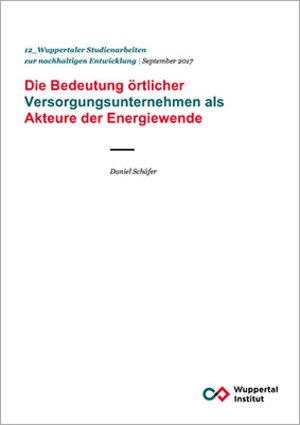
Since 2005, a large part of the German power and gas concession contracts have expired. Thus, many municipalities were given the chance to take their energy supply back into their own hands. At the same time, the municipalities are assuming a more important role in an increasingly decentralized energy supply system, since the implementation of the Federal Government's energy policy objectives takes place primarily on the local level. Therefore, the aim of this thesis was to determine how many municipalities have become active by founding new companies in the energy business area in the period from 2005 to 2016. Furthermore, this thesis aimed to find out what role municipal energy supply companies may assume in the transformation process of the energy transition.
Based on an exploratory study carried out by the Wuppertal Institute in 2013, which covered numerous start-ups up until 2012, in this work a total of 139 municipal energy supply companies could be determined, which were founded between 2005 and 2016. This result shows a distinct trend towards re-communalization in the area of energy supply for this period. In an extensive literature analysis, along with eight expert interviews with municipal contact persons and managing directors of young municipalities, it was furthermore demonstrated that the municipal energy suppliers are, due to their professionalism and their strong networking with the citizens, local and regional actors and the municipality represent, important instruments for the implementation of municipal climate protection targets. They are not only able to position themselves to compete in the energy industry, but can also tap new potentials which are due to their local anchoring largely unused by private energy companies. These include, for example, potentials for energy generation and savings on the customer side, as well as the possibilities for regenerative heat supply through local or district heating and a greater involvement of the citizens. Besides the value-creation effects that the municipalities benefit from, local energy supply companies also enable the active participation in the energy transition, involving local actors and citizens.
Daniel Schäfer:
Die Bedeutung örtlicher Versorgungsunternehmen als Akteure der Energiewende
Wuppertal 2017, ISBN 978-3-946356-06-6
(Wuppertaler Studienarbeiten zur nachhaltigen Entwicklung no. 12)
